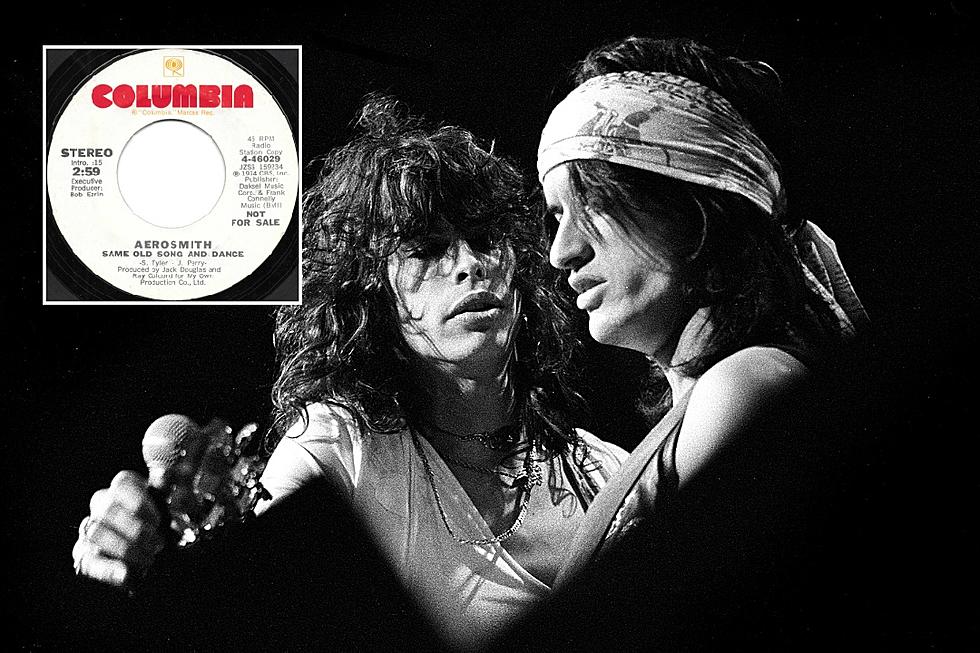
Top 10 Joe Perry Aerosmith Riffs
No disrespect to Aerosmith's second wave, but there's a good reason that our list of the Top 10 Joe Perry Aerosmith Riffs includes only cuts from the '70s: Those later songs contain very few riffs. There are some great songs from that era – which started right around the time a rap remake of "Walk This Way" returned them to the charts – but most are based on traditional pop-songwriting qualities, not rock 'n' roll-powered, air guitar-tested riffs. The 10 here (most written by Perry, all played by him) are rarely clean or pretty. Instead, they're dirty, grimy and just dripping with sticky stuff. And we love each and every one of them just the way they are.
- 10
"Toys in the Attic"
From: 'Toys in the Attic' (1975)The title track to Aerosmith's 1975 classic drives harder and faster than almost anything else in their extensive catalog. In fact, there's almost a punk-like surge to the three-minute "Toys in the Attic" that steers it away from the traditional hard-rock box Aerosmith began to pack themselves into. Even Joe Perry's fierce solo sounds gutsier and angrier than usual – and percolating throughout the entire song is one hell of a riff.
- 9
"Lord of the Thighs"
From: 'Get Your Wings' (1974)The jagged, jittery riff that cuts into "Lord of the Thighs" sorta anticipates Devo's deconstructed take of "(I Can't Get No) Satisfaction" ... which, in a roundabout way, almost makes sense, considering Keith Richards' influence on Perry. But those slicing guitar stabs soon give way to a meatier riff that falls in line with the rest of Aerosmith's second album. It's a pretty basic riff, really, but Perry makes the most of it – turning a so-so sex pun into a 'Get Your Wings' highlight.
- 8
"Draw the Line"
From: 'Draw the Line' (1977)Aerosmith's last decent album before their late-'70s/early-'80s decline suffers from the messy personal and creative blockades that eventually gridlocked and then unraveled the band. But dig a little, and you'll uncover a few gems like the title track – a riff-fueled monster that ranks right up there with their other turbocharged rockers from the period. And check out Steven Tyler's vocal on the last verse; he's never sounded this unleashed. Too bad it all signaled the end of the road, for the time being.
- 7
"Mama Kin"
From: 'Aerosmith' (1973)Aerosmith were still fighting their way through the hard-rock trenches when they released their self-titled debut album in 1973. It would take another two and a half years and a reissue before its big hit and best song, "Dream On," reached the Top 10. So, most of Perry's riffs are either borrowed or, frankly, a bit boring. But "Mama Kin" is bursting with train-kept-a-rollin' locomotive action. The song sounds tentative at times, not sure if it should take that next step, and the rhythm's start-stop progression kinda breaks the flow. But Perry's guitar brims with confidence, slashing at the empty spaces like its very existence depended on it. And maybe it did. Aerosmith's confidence blossomed on their next album.
- 6
"Dream On"
From: 'Aerosmith' (1973)The riff in "Dream On" isn't as prominent, or as evident, as it is in other cuts on our list of the Top 10 Joe Perry Aerosmith Riffs, but it's there. And as Aerosmith's breakthrough hit, it marks a pivotal moment in the band's career. The song actually proved that there was more to the group than the usual hard-rock riffs, igniting a power-ballad streak that helped them sell tons of records during their second act in the '80s and '90s. Still, listen closely enough, and Perry's delicate guitar lines help pull the song to its explosive climax during the final minute and a half. Sometimes subtlety goes a long way.
- 5
"Same Old Song and Dance"
From: 'Get Your Wings' (1974)This slippery riff doesn't even try to play nice with anything else going on around it. From the opening note of the tickling guitar run that courses through "Same Old Song and Dance," there's no point in even bothering to hide Perry's (or rather, Perry's guitar's) intention here: total domination of the best song on Aerosmith's second album. The killer riff sounds as aged and as familiar as the song's title, but Perry manages to inject a youthful, playful energy into a cut that relies entirely on the guitars.
- 4
"Back in the Saddle"
From: 'Rocks' (1976)From the opening coming-round-the-mountain gallop of the drums, bass and guitars, it's pretty obvious something wicked is on the way. And once Joe Perry's guitar charges in with take-no-prisoners stabs, you hardly notice all of the sound effects (whinnying horses, smashing glasses, cracking whips) that attempt to give "Back in the Saddle" a cinematic polish. No matter. Perry's untamed riffing here is sleazy, unbridled and the sort of titanic playing that gives so many of Aerosmith's '70s classics their muscles.
- 3
"Last Child"
From: 'Rocks' (1976)You can sense the bubbling beneath the surface during the first 20 seconds of "Last Child," as Steven Tyler seems to be warming up for another "Dream On"-sized power ballad. But then Perry's slinky riff slips into action, and the song turns into one of Aerosmith's most definitive cuts. The guitar weaves in and out of the vocals, occasionally stopping to brush alongside them. But mostly they evade a basic hard-rock crunch to deliver one of the group's bluesiest, nastiest, riff-driven songs.
- 2
"Sweet Emotion"
From: 'Toys in the Attic' (1975)Admittedly, it's that opening talk-box business that initially draws us in to "Sweet Emotion." But the song cooks just fine without it, too. Check out the way Perry's guitar almost steals the verses away from Steven Tyler throughout. But once the bridge to the nonexistent choruses loads up and fires away, Perry pretty much takes total ownership of one of the band's best songs, right down to the piercing solo on the fade-out.
- 1
"Walk This Way"
From: 'Toys in the Attic' (1975)Perry's all-time greatest riff is also one of rock's all-time greatest. No surprise that rap kings Run-D.M.C. not only wanted it for their own hit song 11 years later, they enlisted Perry and Steven Tyler to perform on it (and essentially rescued Aerosmith's tanked career from oblivion). Everything that made Perry's riffs so great in the '70s – their dirty rawness, the way they played tag with other band members, especially Tyler – is packed into a sweaty guitar workout that has more on its mind than just a casual stroll.
More From Ultimate Classic Rock









